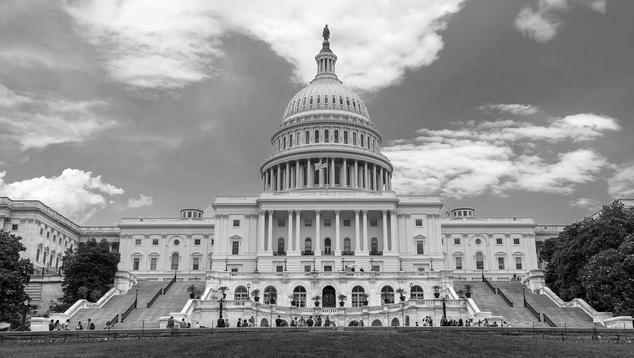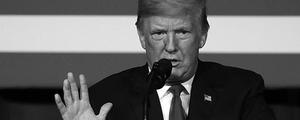Story Highlights
- 35% say government/leadership is top problem facing the country
- Mentions of government jumped during the shutdown, and increased since
- Views of government as the top problem have gained since 2001
WASHINGTON, D.C. -- Thirty-five percent of Americans name the government, poor leadership or politicians as the greatest problem facing the U.S. This is the highest percentage Gallup has recorded for this concern, edging out the previous high of 33% during the 2013 federal government shutdown.
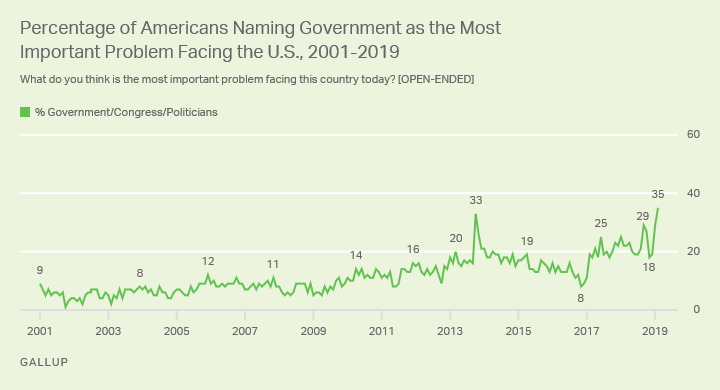
The latest update is from a Feb. 1-10 Gallup Poll. Full results from this month can be found at the end of the article.
Gallup has asked Americans what they felt was the most important problem facing the country since 1939 and has regularly compiled mentions of the government since 1964. Prior to 2001, the highest percentage mentioning government was 26% during the Watergate scandal. Thus, the current measure is the highest in at least 55 years.
The current percentage of Americans naming government as the most important problem is nearly twice as high as the 18% recorded in November. That increase likely reflects public frustration with the government shutdown that occurred from late December through most of January. Gallup observed a similar double-digit spike spanning the 2013 government shutdown, from 16% in September 2013 to 33% in October 2013.
Americans have different things in mind when they name the government as the most important problem. An analysis of the verbatim responses to the question from the latest survey finds that 11% of Americans specifically cite "Donald Trump" as the most important problem, while 5% name "the Democrats" or "liberals" and 1% "Congress." About half of those who say the government is the most important problem -- 18% of U.S. adults -- blame both parties or cite "gridlock," "lack of cooperation" or the shutdown more generally. The latter figure has grown from 6% in December and 12% in January.
Since January 2017, about the time Donald Trump took office, the government has been the top problem each month except in the November poll, and in July 2018. In both of those months, immigration edged out the government at the top of the list.
Views of Problematic Government Have Been on the Rise Since 2001
Americans have become more likely to name the government and/or leadership as the country's greatest problem over the past decade. From 2001 through 2009, yearly averages of this measure were consistently below 10%, but mentions of government as the foremost challenge have become more pervasive in the decade since. In 2010 to 2016, average mentions of the government as the biggest problem ranged from 12% to 19%.
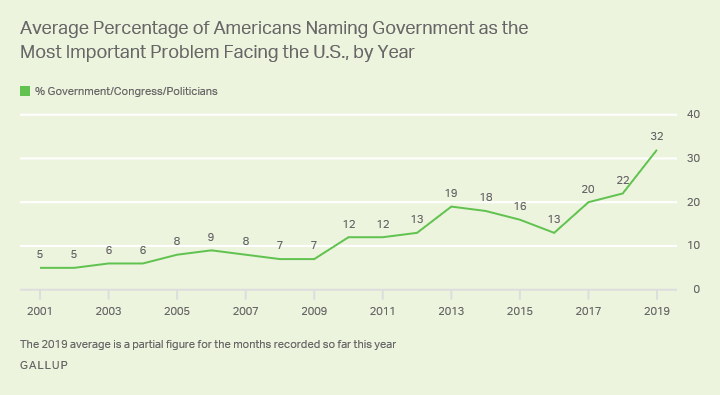
President Donald Trump's first two years in office so far have produced the highest average mentions of government as the most important problem for recent presidents, at 20% and 22%. Though just six weeks into the new year, 2019 could top Trump's first two years if this trend continues.
Few Problems Have Registered Such a High Percentage of Mentions
Gallup began asking about the most important problem on a monthly basis in 2001; since then, few other issues have matched or exceeded the 35% currently mentioning the government.
- In the immediate months after the 9/11 attacks, mentions of terrorism topped the list as the most important problem, peaking at 46% in October 2001.
- Mentions of the situation in Iraq as the greatest U.S. problem escalated in early 2007 after President George W. Bush's announcement of a "surge" in the numbers of American troops sent to the country. The highest percentage naming Iraq as the biggest problem was 38% in February of that year.
- In the year leading up to and after the global financial crisis of 2008, the percentage of Americans naming "the economy" reached record heights for any mention on Gallup's list, reaching 58% in November 2008.
- Mentions of unemployment/jobs as the greatest problem surpassed those of "the economy" at certain points in the years after the financial crisis, with the percentage naming unemployment as the greatest problem peaking at 39% in September 2011, when President Obama unveiled an ambitious jobs plan at a time of high unemployment.
Republicans, Democrats About Equally Likely to Name Government
Mentions of the government have become more frequent among all party groups in recent months -- especially Republicans, among whom there has been a 14-point increase in mentions of the government this past month.
While Democrats were more likely than Republicans to name government and leadership as the top problem facing the nation in the year leading up to the latest poll, both party groups are now about as likely to name government as the top U.S. problem.
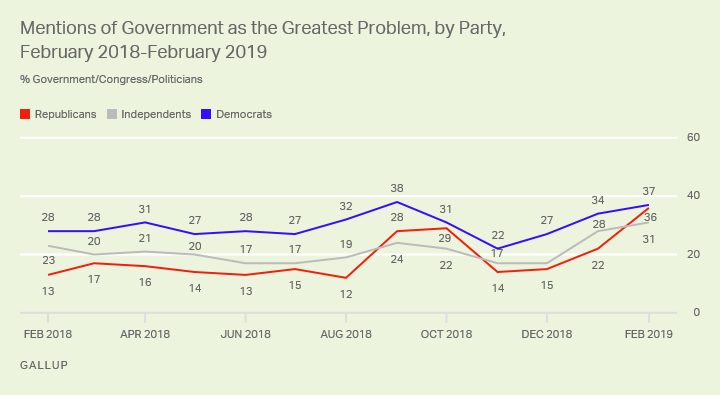
Roughly half of Republicans, Democrats and independents who say the government is the most important problem point to gridlock, lack of bipartisanship, both parties or other general concerns about the way government is operating. As would be expected, Republicans disproportionately mention Democrats or liberals as the problem, while Democrats (as well as independents) disproportionately mention Trump. The number of Democrats who mention Trump specifically has been quite stable in recent months, but there has been a surge in the percentage of Democrats seeing both parties as the problem or citing general concerns about gridlock and lack of cooperation. Likewise, there has been a sharp increase in the number of Republicans and independents seeing both parties, gridlock or related issues as the problem.
Bottom Line
Federal government shutdowns have clear, negative effects on Americans' views on a variety of measures, including their general satisfaction with the direction of the country. But shutdowns aside, Americans' views of the government itself as a problem -- rather than the means of solving problems -- have increased over the past two decades. On one end of Gallup's 2001-2019 trend is the record low of 1% naming the government as the greatest problem, recorded one month after 9/11. On the other end is the latest 35%, as the longest shutdown on record left bad feelings on both sides of the political aisle.
At the moment, Democrats and Republicans are aligned in this view, though likely for different reasons. For Democrats, the shutdown was a stalemate over a border wall they overwhelmingly reject -- from a president of whom few in the party approve. For Republicans -- who show an even greater recent increase in mentions of government as the top U.S. problem -- the ramifications of losing control of the House of Representatives and the party's inability to pass legislation it favors may be dawning on the party's rank and file.
| Feb. 1-10, 2019 | |||||||||||||||||||||||||||||||||||||||||||||||||||||||||||||||||||||||||||||||||||||||||||||||||||
|---|---|---|---|---|---|---|---|---|---|---|---|---|---|---|---|---|---|---|---|---|---|---|---|---|---|---|---|---|---|---|---|---|---|---|---|---|---|---|---|---|---|---|---|---|---|---|---|---|---|---|---|---|---|---|---|---|---|---|---|---|---|---|---|---|---|---|---|---|---|---|---|---|---|---|---|---|---|---|---|---|---|---|---|---|---|---|---|---|---|---|---|---|---|---|---|---|---|---|---|
| % | |||||||||||||||||||||||||||||||||||||||||||||||||||||||||||||||||||||||||||||||||||||||||||||||||||
| The government/Poor leadership | 35 | ||||||||||||||||||||||||||||||||||||||||||||||||||||||||||||||||||||||||||||||||||||||||||||||||||
| Immigration | 19 | ||||||||||||||||||||||||||||||||||||||||||||||||||||||||||||||||||||||||||||||||||||||||||||||||||
| Healthcare | 6 | ||||||||||||||||||||||||||||||||||||||||||||||||||||||||||||||||||||||||||||||||||||||||||||||||||
| Race relations/Racism | 5 | ||||||||||||||||||||||||||||||||||||||||||||||||||||||||||||||||||||||||||||||||||||||||||||||||||
| Unifying the country | 4 | ||||||||||||||||||||||||||||||||||||||||||||||||||||||||||||||||||||||||||||||||||||||||||||||||||
| Poverty/Hunger/Homelessness | 4 | ||||||||||||||||||||||||||||||||||||||||||||||||||||||||||||||||||||||||||||||||||||||||||||||||||
| Environment/Pollution | 3 | ||||||||||||||||||||||||||||||||||||||||||||||||||||||||||||||||||||||||||||||||||||||||||||||||||
| Ethics/Moral/Religious/Family decline | 3 | ||||||||||||||||||||||||||||||||||||||||||||||||||||||||||||||||||||||||||||||||||||||||||||||||||
| Federal budget deficit/Federal debt | 3 | ||||||||||||||||||||||||||||||||||||||||||||||||||||||||||||||||||||||||||||||||||||||||||||||||||
| Economy in general | 3 | ||||||||||||||||||||||||||||||||||||||||||||||||||||||||||||||||||||||||||||||||||||||||||||||||||
| Unemployment/Jobs | 3 | ||||||||||||||||||||||||||||||||||||||||||||||||||||||||||||||||||||||||||||||||||||||||||||||||||
| Lack of respect for each other | 2 | ||||||||||||||||||||||||||||||||||||||||||||||||||||||||||||||||||||||||||||||||||||||||||||||||||
| Education | 2 | ||||||||||||||||||||||||||||||||||||||||||||||||||||||||||||||||||||||||||||||||||||||||||||||||||
| GALLUP, FEB. 1-10, 2019 | |||||||||||||||||||||||||||||||||||||||||||||||||||||||||||||||||||||||||||||||||||||||||||||||||||
View complete question responses and trends (PDF download).
Learn more about how the Gallup Poll Social Series works.
